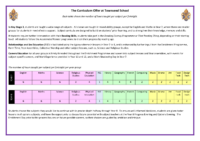Curriculum Overview
Townsend’s Curriculum Intent
Townsend School seeks to provide an education of the highest quality. The ‘Respect for All’ and ‘Achievement for All’ policy is at the heart of what we do and is reflected in our curriculum. It expresses Townsend’s strong commitment to equal opportunities and to life in modern Britain and the world we live. Our curriculum is designed with our students at the centre of what we do. Each child is a valued individual, and our aim is that our students leave Townsend as a good citizen with many opportunities open to them in the future.
For an overview of the Curriculum offer for each key stage at Townsend please view the document below.
Further information on what is covered by each department in more detail can be found on their individual subject pages within the Learning or Sixth Form areas of the website.



